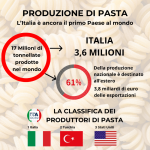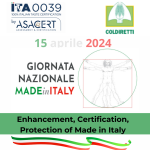A bill concerning the prohibition of the production, use, marketing and importation of synthetic food and feed has been approved on first reading in the Senate.
The measure will also have to be scrutinized by the Chamber of Deputies.
Italy would thus become, the first country in Europe to ban the sale, import and production of synthetic food.
The legislative proposal, presented by the Ministry of Agriculture, Food Sovereignty and Forestry, Francesco Lollobrigida, with the support of the Ministry of Health, reflects the government’s vision for the nation’s future: to preserve the diversity and peculiarities of territories, as well as the link between food, culture and Italy’s agri-food heritage.
Already last September, at the Coldiretti Village in Milan, Ita0039 by Asacert had the opportunity to take a stand against synthetic food, together with its partner Coldiretti, to defend the wholesomeness of Italian products that are the basis of the Mediterranean diet.
“An important news, that of the Senate’s approval of the DDL. – The comment of Fabrizio Capaccioli CEO of Asacert and creator of the ITA0039 Certification Protocol – Italy has a different bond with food than other countries, we are also the nation richest in biodiversity, let alone if we can imagine leaving room for foods that some people call “plastic”, but that in any case are not 100% safe for the health of consumers. The path taken is the right one, after all, we are what we eat, we must defend our productions, healthy carriers of tradition, culture, biodiversity and sustainability. For our part, we continue to fight for these principles and make available to consumers tools, such as our certification and the ITA0039 App, that concretely defend and spread knowledge and awareness about 100% Made in Italy foods,” Capaccioli concludes.
The FAO-OMS report identifies 53 potential hazards associated with synthetic meat. According to the document, these hazards affect all four stages of production: the selection of cells for replication, the actual cultivation in bioreactors, harvesting, and processing.
Investment in the synthetic food sector is steadily increasing, supported by various companies in the technology, chemical-pharmaceutical and financial sectors. In 2020 alone, $366 million was invested in artificial meat, an increase of 6,000% in 5 years.
The goal of the Lollobrigida bill is to ensure the highest level of protection of human health and citizens’ interests, as well as to preserve Italy’s agrifood heritage as an essential part of national interests.
To reinforce the priority of protecting the health of citizens and the national industry, administrative and disqualifying penalties are provided for violations, ranging from a minimum of €10,000.00 up to 10 percent of the turnover achieved in the last fiscal year prior to the violation ascertained. The penalties will apply to anyone who has financed, promoted or facilitated illegal behavior in any way.






